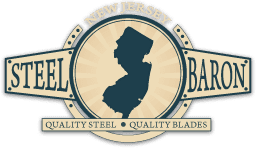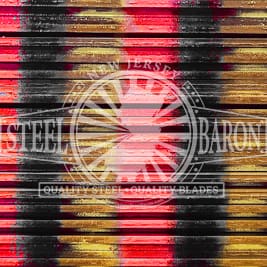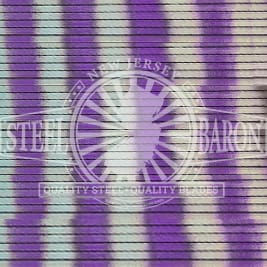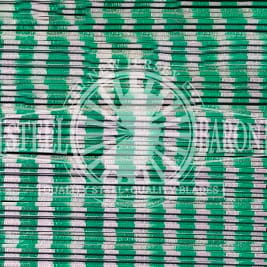Description
NOTE FOR ON-SIZED STOCK – On-size is only available in 1/4″ (.250″) thickness, 1″, 1.25″, 1.5″, 2″, and 4″ widths, and 48″ and 24″ lengths.
- Unlike our standard rolled 1/4″ 80CrV2 which comes slightly oversized at a minimum of .265
- ON-SIZED material mics at a minimum of .250
Although mistaken to be the new kid on the block, 80CrV2 has actually been around for ages under the common nickname “Swedish saw steel.”
A high carbon chrome-vanadium, 80CrV2 is a tough as nails workhorse steel.
It provides the essential qualities of a 1080-series steel, with all the perks of a high chrome steel like 5160.
We’ve brought it on board for its ability to be readily forged and ground alike, and like 5160, only need a very simple heat treat similar to 5160 that will meet all the expectations of seasoned pros and be more forgiving to makers just beginning.
It’s for these reasons that many makers whose careers were built on 5160 have joined us and made 80CrV2 their go-to steel for everything they make.
If you have a task you think would fit 5160, give 80CrV2 a try–it’s an excellent chrome-based high carbon steel with some additional perks in grain refinement that will leave you grinning every time.
From kitchen knives to tomahawks and swords, to pocket knives and hunters on down to little craft carving blades, 80CrV2 is a champ in the making, no matter the project.
Only logged in customers who have purchased this product may leave a review.
80CRV2 Heat Treat
You can download our 80CRV2 Heat Treat PDF. It contains all of the information mentioned below.
Normalization
- Normalization is a process intended to refine grain and stress relieve blades prior to hardening when needed.
- Turco, ATP-641, foil, or similar may be used to reduce surface decarburization and scaling.
- Time at temperature suggested for varying thicknesses. Once knife has cooled to black and magnetic, it can be cycled again–be careful handling hot blades.
| 1st Cycle |
2nd Cycle |
3rd Cycle |
1,650°F / 898°C
Hold 10-15 minutes |
1,500°F / 815°C
Hold 10-15 minutes |
1,350°F / 732°C
Hold 10-15 minutes |
Hardening
- ATP-641, Turco, or similar high temperature anti-scale/decarburization coatings can be used to reduce scale or surface decarburization.
- Data is representative of controlled heat treating equipment (e.g. oven, salts, etc.) temperatures and industrial standard quenchant.
- Suggested quench oil: Parks 50–expected as quenched hardness may be lower if a slower quench oil or non-industrial quench medium is used.
- Austenizing soak time varies 5 to 15 minutes based on heat treating equipment and cross section–soak times are reduced to minimum for people heat treating in a forge–forge heat treating without PID temperature control limits accurate means of maintaining temperature. If using calibrated, proper industrial equipment for heat treating, use the supplied extended soak times based on over all steel thickness.
- Do not put blades in oven when cold, insert at or just below austenizing temperature–temperature variances is for difference in stock thicknesses and a window of margin for error.
| Austenizing Temperature |
Expected RC (as quenched) |
1,450V-1,480°F / 788-804°C
Soak 5-15 minutes |
64-65RC |
Tempering
- Once blade is quenched and near ambient temperature, blades should be tempered accordingly, the times suggested are to ensure even, consistent temperature.
- Figures supplied are as representative of industrial standards.
- If using a small toaster oven or household kitchen oven for tempering, using a blade holding rack made from kiln furniture, a roasting tray lined with fine sand, or similar large object will help retain thermal mass to reduce wide swinging temperatures as the device fluctuates trying to maintain temperature.
- Note: Final hardness values vary based on initial as-quenched hardness and percentage of conversion to Martensite. Only reliable testing methods, e.g. calibrated Rockwell hardness tester, can provide actual hardness values–hardness calibrated files and chisels are relative testing methods and inaccurate for true hardness value reading.
- Temper twice for 2hrs.
- The included Heat Treat Schedule on this page is formulated based upon Industry standards and data from ASM International, Crucible and other foundry spec sheets, and Kevin Cashen (independent researcher, ferroalloy metallurgist, and bladesmith of Matherton Forge).
| Temperature |
Hardness (2 hour x2 guideline) |
| 300°F / 149°C |
65 |
| 350°F / 177°C |
63-64 |
| 400°F / 204°C |
60-61 |
| 450°F / 232°C |
57-58 |
| 500°F / 260°C |
55-56 |
| 550°F / 288°C |
53-54 |
| 600°F / 316°C |
52-53 |
| 650°F / 343°C |
50 |
Heat Treating Disclaimer
- Suggested heat treatment are based on the recommended specifications for use in ovens, high temp salts, and similarly, properly calibrated equipment; and in line with proper industrial standards for quenching. Deviation from industry standards for schedules, equipment, quenching mediums; and hardness testing equipment may result in varied results. The supplied information on this page is on a generalized scale with the above mentioned standards and methods, which is why soak times and similar aspects may vary in time length to include a margin for the available heat treating equipment and steel cross section.
- If you are unsure if you have the necessary means to heat treat on-site, we recommend professional heat treating services provided by Peters Heat Treat or Bos Heat treating; or industry specific services by knife material dealers such as TruGrit or Texas Knifemaker’s Supply–check with suppliers to see if they offer HT services and ensure they follow industry standards.
- NJSB LLC is not liable or responsible if proper industry heat treating protocols are not applied; particularly and especially if sending to an independent heat treat provider if they do not follow the intended heat treat schedule or standards for that particular steel; or damage they cause while in their possession.








Reviews
There are no reviews yet.